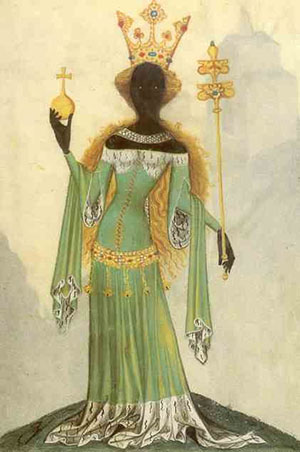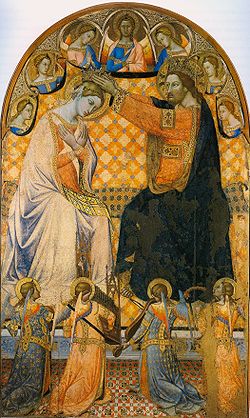
The Queen of Sheba, from a 15th-century manuscript now at Staats – und Universitätsbibliothek Gottingen 
Sanctae Mariae Coronavi by Giacomo di Mino‘s Gothic version. Circa 1340–1350
The Queen of Sheba, whom Jesus refers to as “the Queen of the South” who “came from the uttermost parts of the earth”, i.e. from the extremities of the then known world, to hear the wisdom of Solomon (Matthew 12:42, Luke 11:31), has long fascinated us. She is a mysterious figure who appears briefly in 1 Kings 10 and 2 Chronicles 9 and then seems to vanish again. Who was she? What do we really know about her? Why should we care?
Sheba, also known as “Saba,” is mentioned in the Psalms. It was a wealthy kingdom that included modern Yemen and Ethiopia and was connected to a vast network of trading routes and business exchanges. When the Queen came to visit King Solomon, it might well have been a trade mission–a sort of G8 meeting!–to make new trade deals and sign new business agreements between the two monarchs. Solomon and the Queen were both known for their wisdom and keen senses; while striking their business deals, they traded riddles. Folklore has suggested many possible riddles that they might have traded, including the famous, “What land has only seen the sun once?” (Answer: the bottom of the Red Sea, which was exposed to sunlight when it parted for Moses and the Hebrews to escape from Egypt.)
Origen, who wrote a voluminous commentary on the Song of Songs, identified the bride of the Song with the “queen of the South” of the Gospels, i.e. the Queen of Sheba, and assumed she was Ethiopian as the bride in the Song says, “I am black and beautiful” (μέλαινα εἰμί καί καλή ). Not only is the bride in the Song identified as the Queen of Sheba, the bride is also understood by Christians to be an allusion to both the Church and the Mother of God. (It is the identification of the Mother of God with the dark and beautiful bride that results in the depictions of the “black Madonna.”) Because of the identification of the bride as Queen, Church, and Mother of God, the Queen of Sheba herself comes to be seen as a type of the Church and the Mother of God: the wonderful gifts of gold and incense that the Queen brings Solomon is seen as a foreshadowing of the adoration of the Magi (Matthew 2) and the Queen of Sheba enthroned represents the coronation of the virgin.
